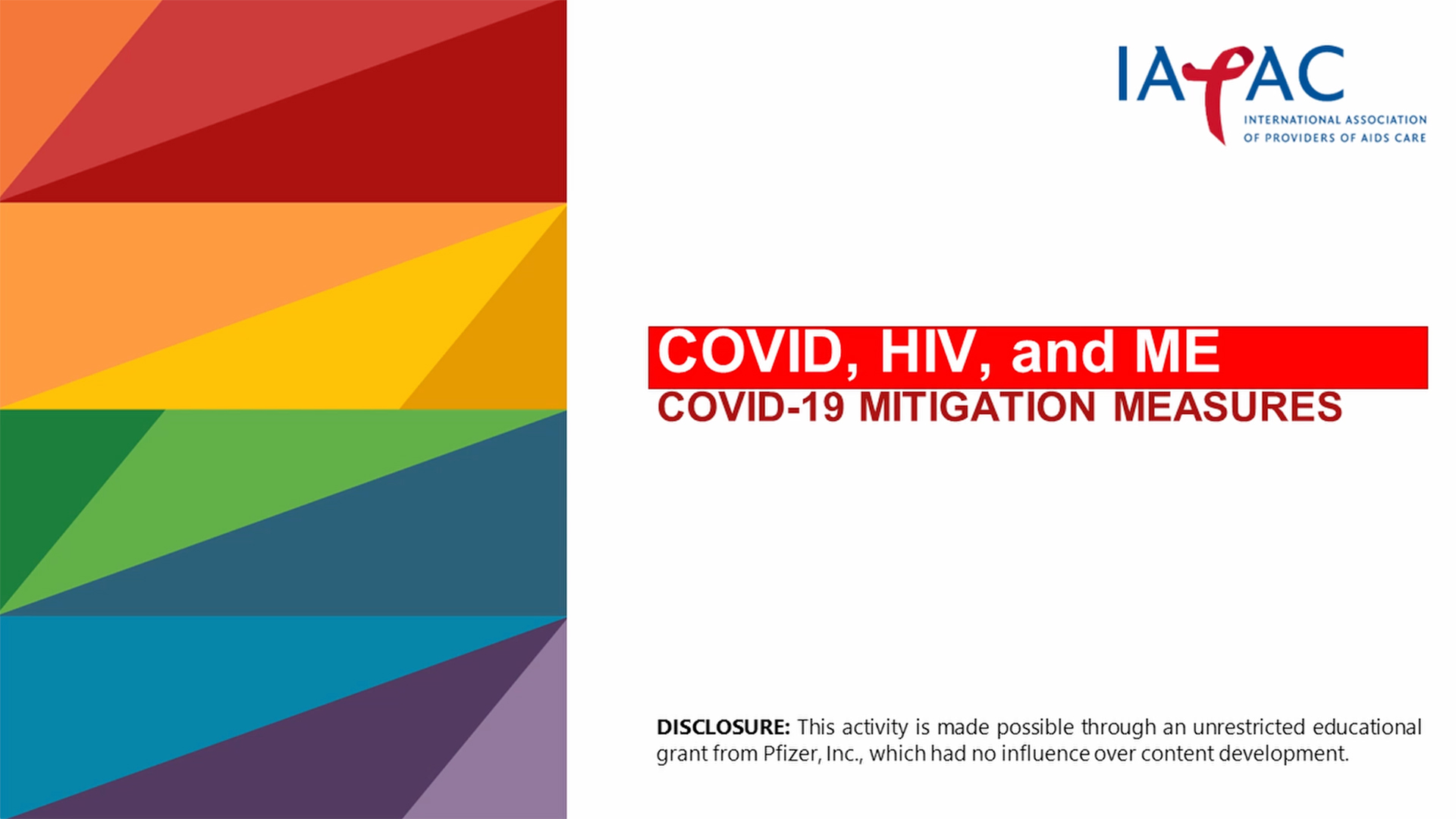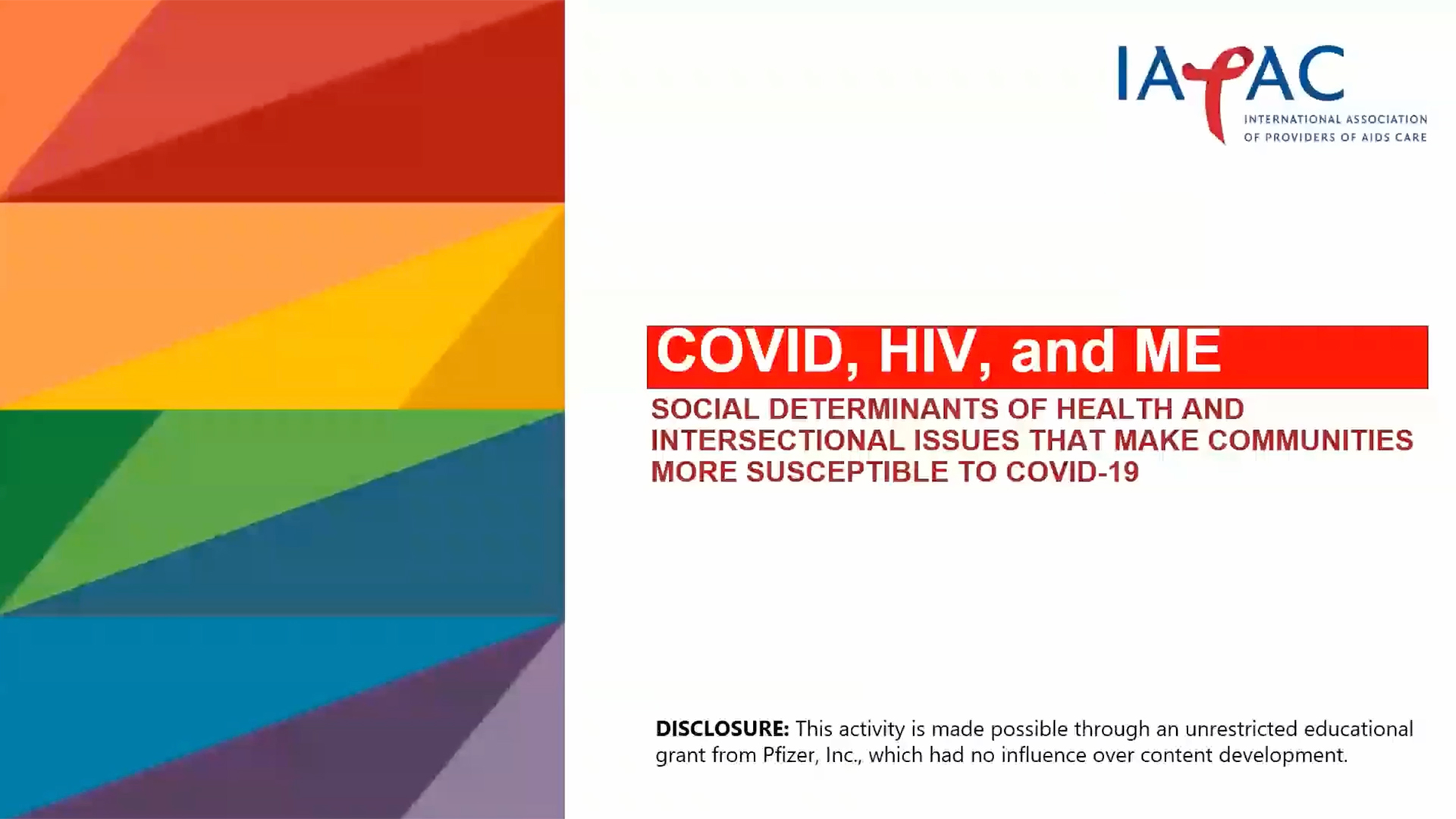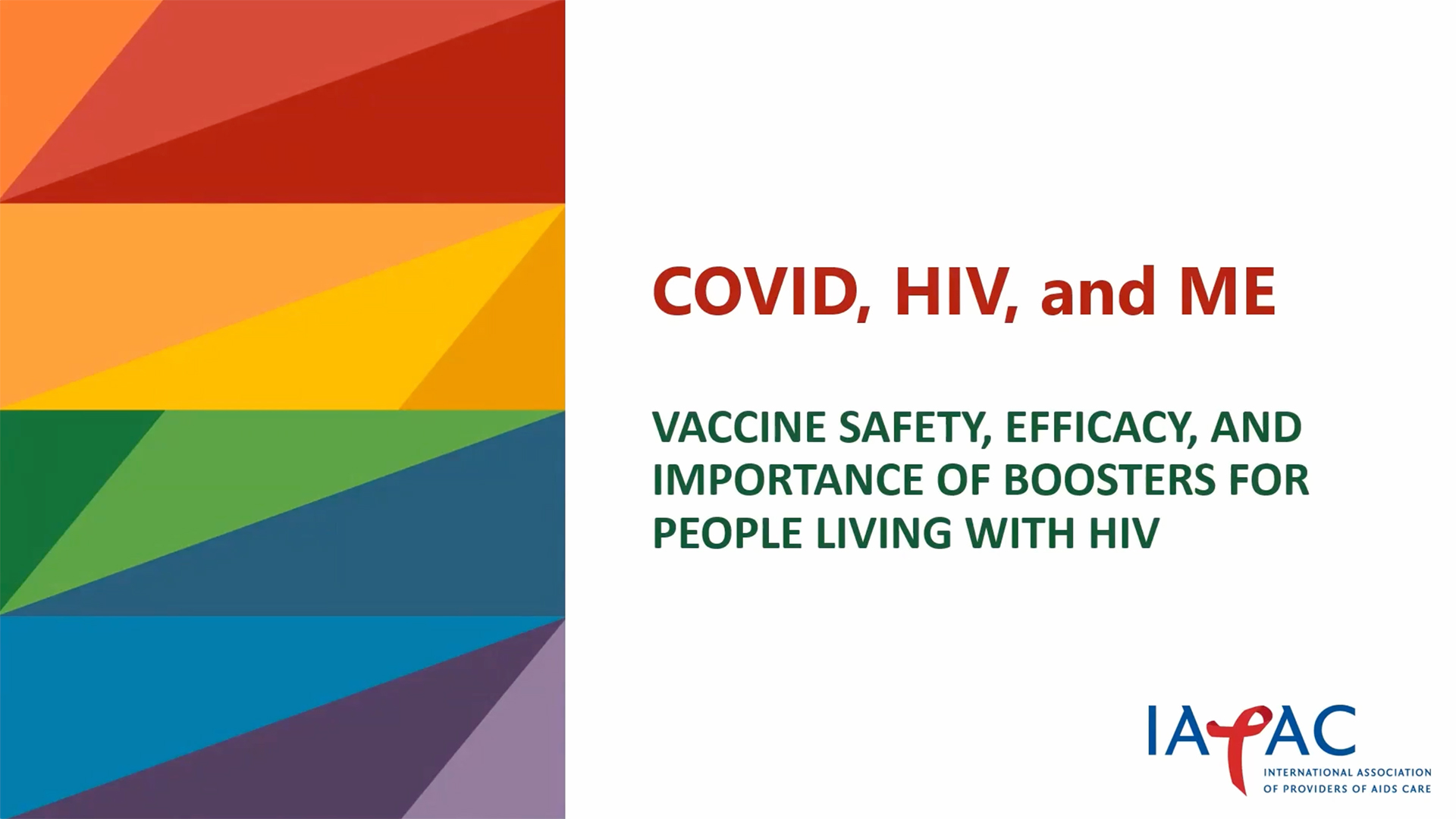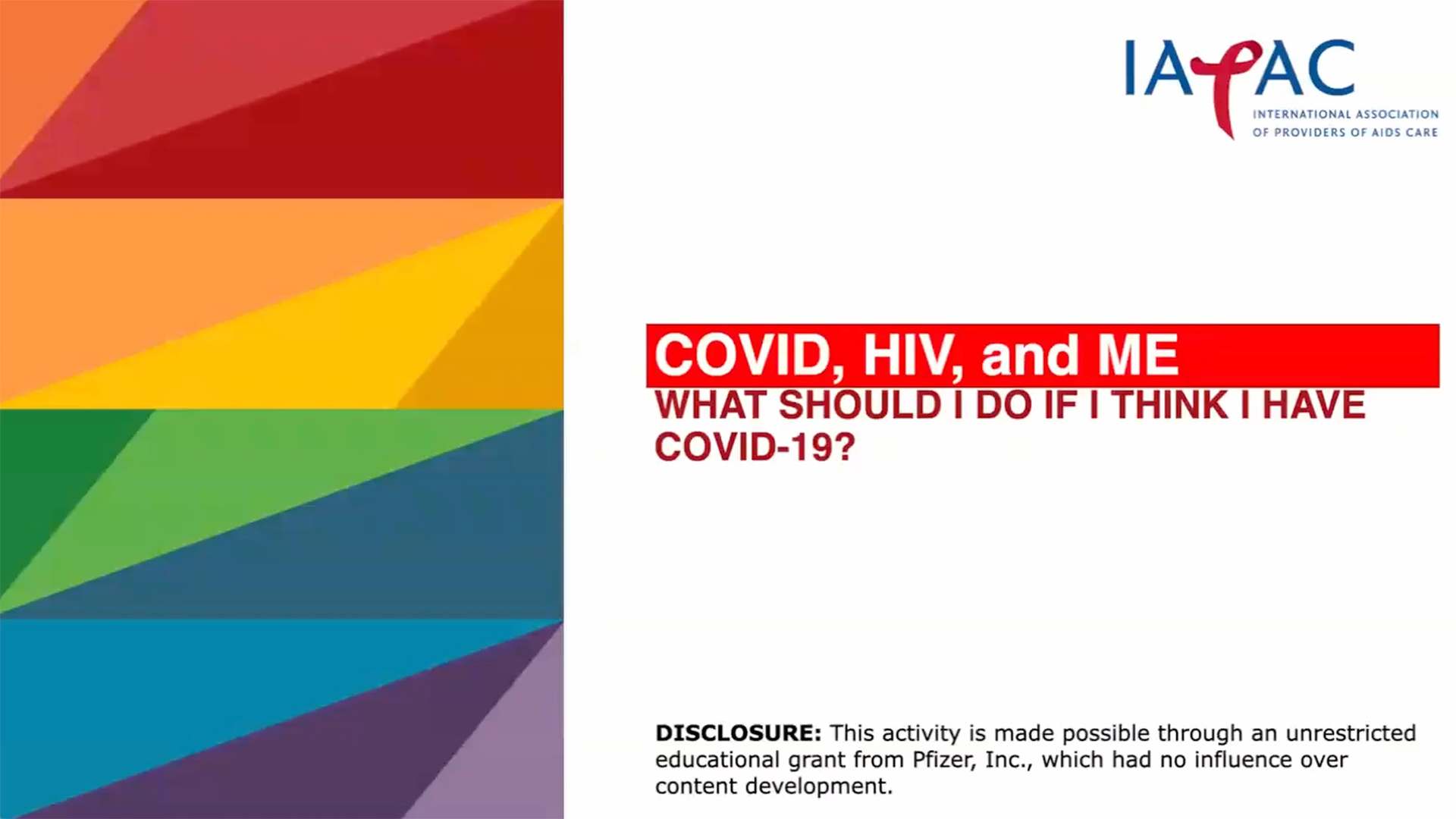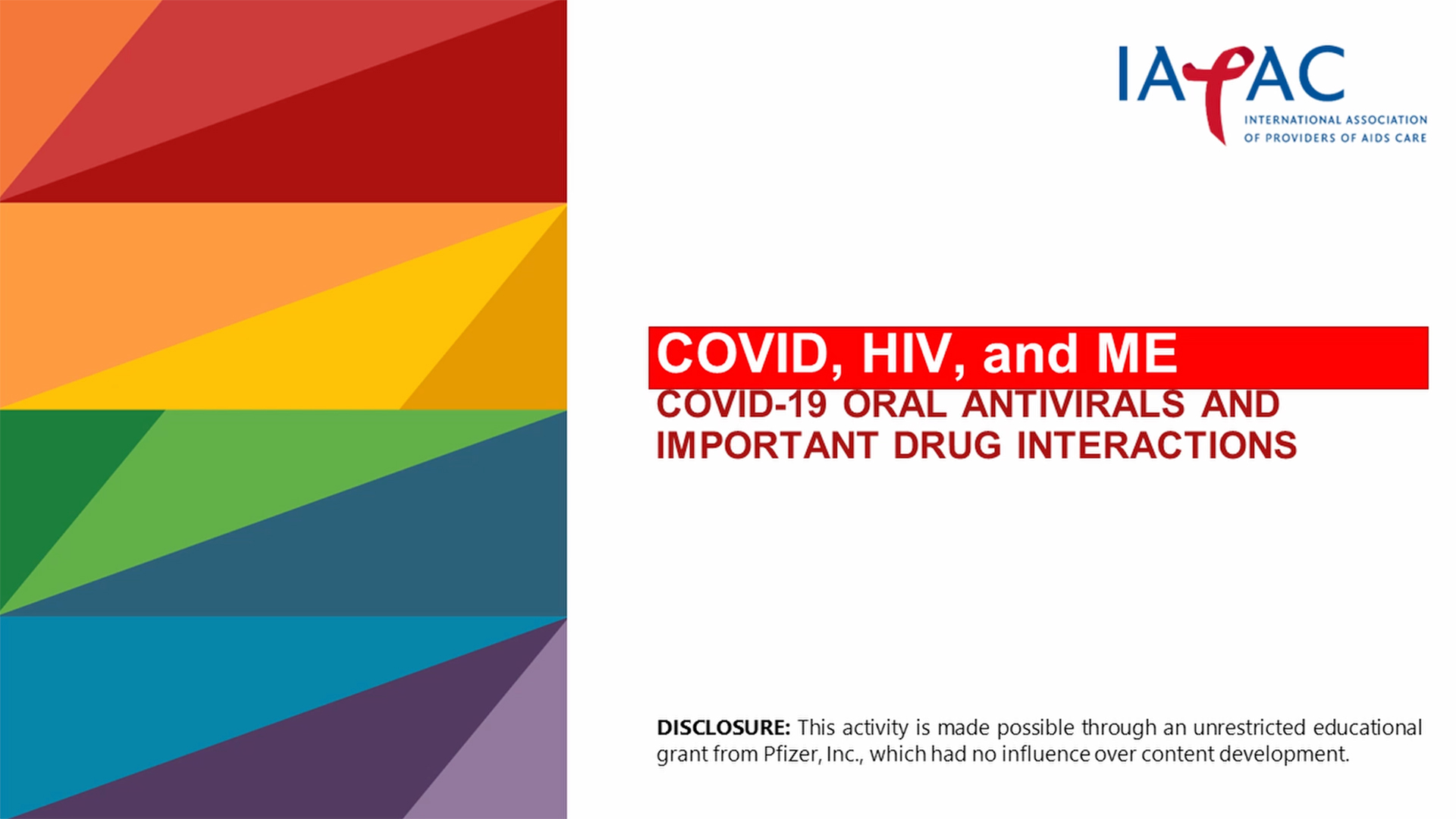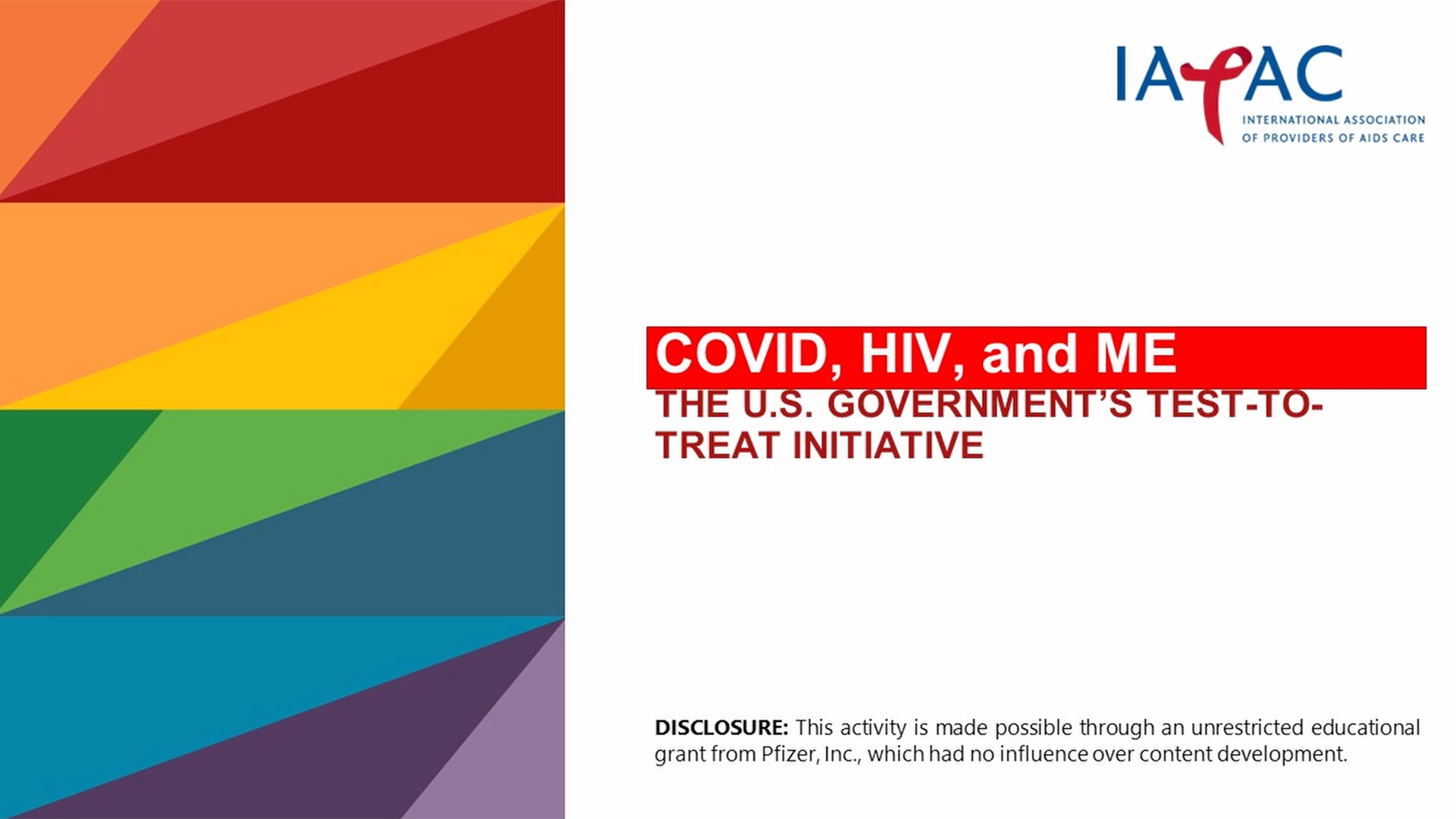The IAPAC COVID-19 Resource Page is a repository of information for clinicians delivering medical and psychosocial services to people living with and affected by HIV, as well as people living with HIV who may have questions related to COVID-19 infection in relation to HIV disease.
NOTE: If you are a person living with HIV, click here to skip ahead to our COVID-19, HIV, and Me informational video micromodules.
FDA Approves and Authorizes Updated mRNA COVID-19 Vaccines to Better Protect Against Currently Circulating Variants
On Augusr 22, 2024 the U.S. Food and Drug Administration approved and granted emergency use authorization (EUA) for updated mRNA COVID-19 vaccines (2024-2025 formula) to include a monovalent (single) component that corresponds to the Omicron variant KP.2 strain of SARS-CoV-2. The mRNA COVID-19 vaccines have been updated with this formula to more closely target currently circulating variants and provide better protection against serious consequences of COVID-19, including hospitalization and death. Today’s actions relate to updated mRNA COVID-19 vaccines manufactured by ModernaTX Inc. and Pfizer Inc.
In early June, the FDA advised manufacturers of licensed and authorized COVID-19 vaccines that the COVID-19 vaccines (2024-2025 formula) should be monovalent JN.1 vaccines. Based on the further evolution of SARS-CoV-2 and a rise in cases of COVID-19, the agency subsequently determined and advised manufacturers that the preferred JN.1-lineage for the COVID-19 vaccines (2024-2025 formula) is the KP.2 strain, if feasible.
“Vaccination continues to be the cornerstone of COVID-19 prevention,” said Peter Marks, M.D., Ph.D., director of the FDA’s Center for Biologics Evaluation and Research. “These updated vaccines meet the agency’s rigorous, scientific standards for safety, effectiveness, and manufacturing quality. Given waning immunity of the population from previous exposure to the virus and from prior vaccination, we strongly encourage those who are eligible to consider receiving an updated COVID-19 vaccine to provide better protection against currently circulating variants.”
The updated mRNA COVID-19 vaccines include Comirnaty and Spikevax, both of which are approved for individuals 12 years of age and older, and the Moderna COVID-19 Vaccine and Pfizer-BioNTech COVID-19 Vaccine, both of which are authorized for emergency use for individuals 6 months through 11 years of age.
What You Need to Know
- Unvaccinated individuals 6 months through 4 years of age are eligible to receive three doses of the updated, authorized Pfizer-BioNTech COVID-19 Vaccine or two doses of the updated, authorized Moderna COVID-19 Vaccine.
- Individuals 6 months through 4 years of age who have previously been vaccinated against COVID-19 are eligible to receive one or two doses of the updated, authorized Moderna or Pfizer-BioNTech COVID-19 vaccines (timing and number of doses to administer depends on the previous COVID-19 vaccine received).
- Individuals 5 years through 11 years of age regardless of previous vaccination are eligible to receive a single dose of the updated, authorized Moderna or Pfizer-BioNTech COVID-19 vaccines; if previously vaccinated, the dose is administered at least 2 months after the last dose of any COVID-19 vaccine.
- Individuals 12 years of age and older are eligible to receive a single dose of the updated, approved Comirnaty or the updated, approved Spikevax; if previously vaccinated, the dose is administered at least 2 months since the last dose of any COVID-19 vaccine.
- Additional doses are authorized for certain immunocompromised individuals ages 6 months through 11 years of age as described in the Moderna COVID-19 Vaccine and Pfizer-BioNTech COVID-19 Vaccine fact sheets.
Clinician Guidance
COVID-19 and HIV
According to the US Centers for Disease Control and Prevention (CDC), almost half of people in the United States with diagnosed HIV are age 50 or older. People with living HIV also have higher rates of certain underlying health conditions, or co-morbidities. Older age and underlying health conditions can make people more susceptible to serious illness if they get COVID-19.
Following is a summary of World Health Organization (WHO) guidance regarding COVID-19 and HIV:
- People living with HIV who have not achieved viral suppression through antiretroviral therapy (ART) may have a compromised immune system that leaves them vulnerable to opportunistic infections and further disease progression.
- At present there is no evidence to suggest that there is an increased risk of infection and increased severity of illness for people living with HIV.
- Current clinical data suggest the main COVID-19 mortality risk factors are linked to older age and other comorbidities including cardiovascular disease, diabetes, chronic respiratory disease, and hypertension. Some very healthy and younger people have also developed severe disease from coronavirus infection.
- People living with HIV who know their HIV status are advised to take the same precautions as the general population (e.g., wash hands often, cough hygiene, avoid touching your face, social distance, seek medical care if symptomatic, self-isolate if in contact with someone with COVID-19, and other actions per local and national government responses).
- People living with HIV who are on antiretroviral drugs should ensure they have at least a 30-day supply of these drugs, if not a 3- to 6-month supply and ensure that their vaccinations are up to date (influenza and pneumococcal vaccines).
- Polypharmacy considerations should also be taken into account, including related to adequate supplies of medications for comorbidities (e.g., hypertension, diabetes), as well as contraception and gender-affirming hormone therapy.
- It is also an important opportunity to ensure that all people living with HIV who are not yet on ART get initiated on ART to achieve viral suppression. People who feel they may have been at risk for HIV acquisition are advised to seek testing to protect against HIV disease progression and complications from any other comorbidities.
There is no evidence that HIV treatment with ART is effective to treat COVID-19. Similarly, there is no evidence that pre-exposure prophylaxis (PrEP) prevents the acquisition of SARS-CoV-2 infection, or that its use will help patients recover quicker. If you are having unprotected sex and you think you are vulnerable to acquiring HIV, continue to take PrEP as prescribed.
Following are some validated web resources to provide additional information related to the clinical management of COVID-19 within the context of HIV disease:
Global Resources
World Health Organization Coronavirus Homepage (World Health Organization)
Coronavirus Disease (COVID-19): HIV and Antiretrovirals (World Health Organization)
What People Living with HIV Need to Know about HIV and COVID-19 (UNAIDS)
COVID-19 Prevention and Control among People who use Drugs and People in Prisons (UN Office on Drugs and Crime)
Information note on HIV and COVID-19 (World Health Organization)
WHO Science Episode 4No. 8 – HIV & COVID-19 (World Health Organization)
WHO Report: Clinical features and prognostic factors of COVID-19 in people living with HIV hospitalized with suspected or confirmed SARS-CoV-2 infection (World Health Organization)
Community Resources
COVID-19 and Coronavirus in People Living with HIV (NAM, AIDSMAP)
Coronavirus Information for People Living with HIV (POZ)
HIV and COVID-19: What Do We Know Now? (POZ)
COVID-19 Information for People Living with Viral Hepatitis (World Hepatitis Alliance)
Vaccine Resources
Vaccines for COVID-19 (US Centers for Disease Control and Prevention)
COVID-19 Vaccine Booster Shots (US Centers for Disease Control and Prevention)
Stay Up to Date with COVID-19 Vaccines Including Boosters (US Centers for Disease Control and Prevention)
Allergic Reactions after COVID-19 Vaccination (US Centers for Disease Control and Prevention)
COVID-19 vaccines in people with HIV (AIDSMAP)
Pfizer-BioNTech COVID-19 Vaccines (US Food & Drug Administration)
Moderna COVID-19 Vaccines (US Food & Drug Administration)
Janssen COVID-19 Vaccine (US Food & Drug Administration)
COVID-19 Vaccines and People with HIV – Frequently Asked Questions (HIVMA)
COVID-19 Vaccination Recommendations for People with HIV (HIVMA)
Oral Antiviral Resources
What are Oral Antivirals? (U.S. Department of Health & Human Services)
Fact Sheet For Patients, Parents, And Caregivers: Emergency Use Authorization (EUA) Of Paxlovid For Coronavirus Disease 2019 (COVID-19) (US Food & Drug Administration)
PAXLOVID™ (nirmatrelvir and ritonavir) (Pfizer)
Fact Sheet For Healthcare Providers: Emergency Use Authorization For Paxlovid (US Food & Drug Administration)
Ritonavir-Boosted Nirmatrelvir (Paxlovid) (US National Institutes for Health)
COVID-19 Rebound After Paxlovid Treatment (US Centers for Disease Control and Prevention)
Fact Sheet for Patients and Caregivers: Emergency Use Authorization (EUA) Of LAGEVRIO (molnupiravir) Capsules for Coronavirus Disease 2019 (COVID-19) (US Food & Drug Administration)
Lagevrio (molnupiravir) (Office of the Assistant Secretary for Preparedness and Response)
Patient Guidance
COVID-19, HIV, and Me
According to the US Centers for Disease Control and Prevention (CDC), almost half of people in the United States with diagnosed HIV are age 50 or older. People with living HIV also have higher rates of certain underlying health conditions, or co-morbidities. Older age and underlying health conditions can make you more susceptible to serious illness if you get COVID-19, so you should be as informed as possible to work with your healthcare provider to minimize your risk of exposure, including by getting vaccinated and boosted, as well as seeking treatment if you acquire COVID-19 infection.
COVID-19, HIV, and Me consists of six video micromodules designed to offer people living with HIV access to user-friendly information across a range of issues, including COVID-19 prevention, vaccine safety, test-and-treat options, drug-drug interactions, and intersectional considerations. Please take the time to review each micromodules and share a link to them with your family and friends who may find the information useful.
DISCLOSURE: This activity is made possible through an unrestricted educational grant from Pfizer, Inc., which had no influence over any aspect of content development consistent with IAPAC’s firewall policy for pharmaceutical industry support of medical and patient education activities.
